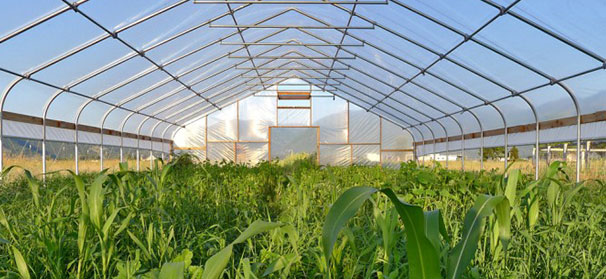
Jul 18, 2013USDA program helps growers purchase tunnels
Thinking about buying a high tunnel to extend your growing season? USDA might pay most of the cost – if you qualify for Environmental Quality Incentives Program (EQIP) funds.
Overseen by USDA’s Natural Resources Conservation Service (NRCS), the Seasonal High Tunnel Initiative is funded through EQIP. The primary goal of the initiative, which helps agricultural producers purchase high tunnels, is to extend the growing season. Improving soil health and managing pests are other considerations, said Mark Rose, NRCS EQIP team leader.
The high tunnel initiative was started in 2010 as a pilot project, but is now offered in all 50 states. Through it, more than 7,800 high tunnels have been installed or planned across the country, with EQIP contributing $44.7 million toward the purchase and installation of those tunnels. In addition, about $16 million has already been committed for fiscal year 2013, according to Rose.
The top five states to use the high tunnel program are Missouri, Alaska, Minnesota, Wisconsin and Michigan. Urban farmers have recently shown interest in the initiative. More than 20 high tunnels have been installed on agricultural parcels in Cleveland, for example. Users of the program are typically vegetable growers, Rose said.
There are two main criteria to qualify for funding from the initiative, he said: You need to be an agricultural producer, and you need land that is under agricultural production. (You might not qualify if your annual income is more than $1 million. And if you farm on highly erodible land, you’ll need to have a conservation plan in place that meets USDA requirements, he said.)
To find out if you qualify, the first thing you need to do is find your local NRCS office or USDA service center. There’s one in just about every county in the country. Once there, tell them you’re interested in the high tunnel initiative. If you’re a new customer, the local conservationist will most likely want to visit your operation to make sure the land concerned is in agricultural production. If everything checks out, the next step will be to come up with a conservation plan, with assistance from the conservationist. With that plan in place, you can apply for EQIP funding, Rose said.
Approval doesn’t happen overnight. Even if you sign up now, you’re unlikely to get funding for fiscal year 2013 – though you might be eligible for fiscal year 2014 (which begins in October). Applications are reviewed and ranked, and the highest-ranking applications get first crack at the funding – which is desirable, because the funds typically run out before the applications do, he said.
When accepted for funding, NRCS personnel develop an EQIP contract with each qualified applicant, which establishes the payment rate for installing the high tunnel. If you qualify, you can get up to 75 percent of your costs paid for. So, if your tunnel materials and installation cost $10,000, EQIP would send you a check for $7,500. Historically underserved applicants, including beginning farmers and minorities, can get up to 90 percent of their costs funded, Rose said.
The applicants purchase the tunnels, which have to meet USDA’s specifications. They can’t cover more than 2,500 square feet, for example. Also, crops covered by the tunnel have to be grown in the actual soil underneath. Growing in pots on top of the ground, for example, wouldn’t qualify, he said.
Once the tunnel is in place, a USDA representative will certify its installation. EQIP contracts typically expire within three years of the installation, though in some cases a contract might last 10 years. NRCS and EQIP standards must be adhered to for the life of the contract, Rose said.
















